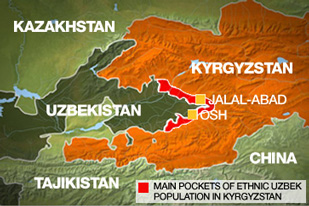Kyrgyz violence level ‘alarming’
Children being killed and civilians raped in ethnic unrest in country’s south, UN says.

Separately, the United Nations Children’s Fund (Unicef) has reported that 90 per cent of the refugees from the fighting were children, women and the elderly.
Many children have suffered from physical and mental violence during the unrest, it said.
Accounts of rape
Among those who have made it across the border into Uzbekistan were three sisters, aged between 16 and 23, who had been raped in front of each other by a mob of ethnic Kyrgyz men, an Uzbek doctor said.
“These girls were raped recently and by a lot of men and for several hours, according to their injuries,” Mukaddas Majidova, a doctor in the Uzbek town of Khoja-Obod, told the AFP news agency.
| IN DEPTH | |||||||||||||||||||||||||
|
Anna Neistat, a senior researcher with Human Rights Watch, told Al Jazeera: “There are allegations of sexual abuse, we have not been able to confirm them so far.”
Uzbekistan closed the border on Monday to all except those with fresh wounds or special needs, saying it did not have resources to cope with the mass exodus.
It reopened three checkpoints to let in more than 60 wounded people late on Tuesday.
The US has promised Kyrgystan’s interim government $800,000 in emergency aid funds and has dispatched Robert Blake, its special envoy, to the country.
Roza Otunbayeva, Kyrgyzstan’s interim president, initially called for Russia to send peacekeepers, but later rescinded the request.
“There is not a need to send peacekeeping forces,” she said.
“We hope to deal with this situation with our own forces,” she said, claiming that clashes are “on the wane”.
But Robin Forestier-Walker, Al Jazeera’s correspondent reporting from the border between Kyrgyzstan and Uzbekistan on Wednesday, said that fighting continued overnight.
“Last night saw [an] exchange of small-arms fire and larger artillery rounds”, including tank shells fired by Kyrgz military forces, he said.
UN suspicions
Against this backdrop of continued tensions, suspicion is growing that the fighting between ethnic Uzbeks and Kyrgyz had been deliberately ignited.
The UN says there is evidence that the violence was co-ordinated and began with five simultaneous attacks in the city of Osh.
|
Roza Otunbayeva, the interim Kyrgyz president, talks to Al Jazeera’s Clayton Swisher |
Rupert Colville, a spokesman for the UN High Commissioner for Human Rights, said “it might be wrong to cast it, at least in origin, as an inter-ethnic conflict.
“There seems to be other agendas driving it initially”.
He said in Geneva on Tuesday that his office had collected witness accounts, including from UN staff, in the cities of Osh and Jalal-abad.
“Several of these reports suggest that the incident began with five simultaneous attacks in Osh involving men wearing balaclavas and carrying guns. It looked like they were seeking to provoke a reaction,” Colville said.
He said that one of the attacks was on a gym which he said was “known to be the haunt of a criminal gang.
“Targeting that gym was likely to provoke a reaction.”
However, the UN was not in a position to make any direct accusations against any particular individuals or groups at this point, Colville said.
Bakiyev blamed
Witnesses have said the unrest started with mobs of Kyrgyz men attacking ethnic Uzbeks and torching their homes.
The interim government, which assumed power after the president was overthrown in April, has repeatedly accused Kurmanbek Bakiyev, the ousted president, of stoking the conflict.
|
|
Otunbayeva, the interim leader, says she has “no doubt” Bakiyev is to blame.
“His sons have been discussing that they want to organise such a crisis and we thought not of such a scale and not of such a deepness,” she told Al Jazeera in an interview on Tuesday.
About a month ago, an audio recording was posted anonymously on YouTube with a caption identifying the voices as those of Bakiyev’s son Maxim and his uncle Janybek.
The men were discussing plans to arm groups to spread chaos across the south of Kyrgyzstan, sometime in June.
Both men have denied the authenticity of the tape and Bakiyev has repeatedly said he has no involvement in the violence.
The interim government has accused Maxim Bakiyev of financing the ongoing clashes.
The younger Bakiyev was arrested by UK authorities on Monday as he landed at Farnborough airport in a private aircraft.
The Kyrgyz government said it would seek his extradition.


